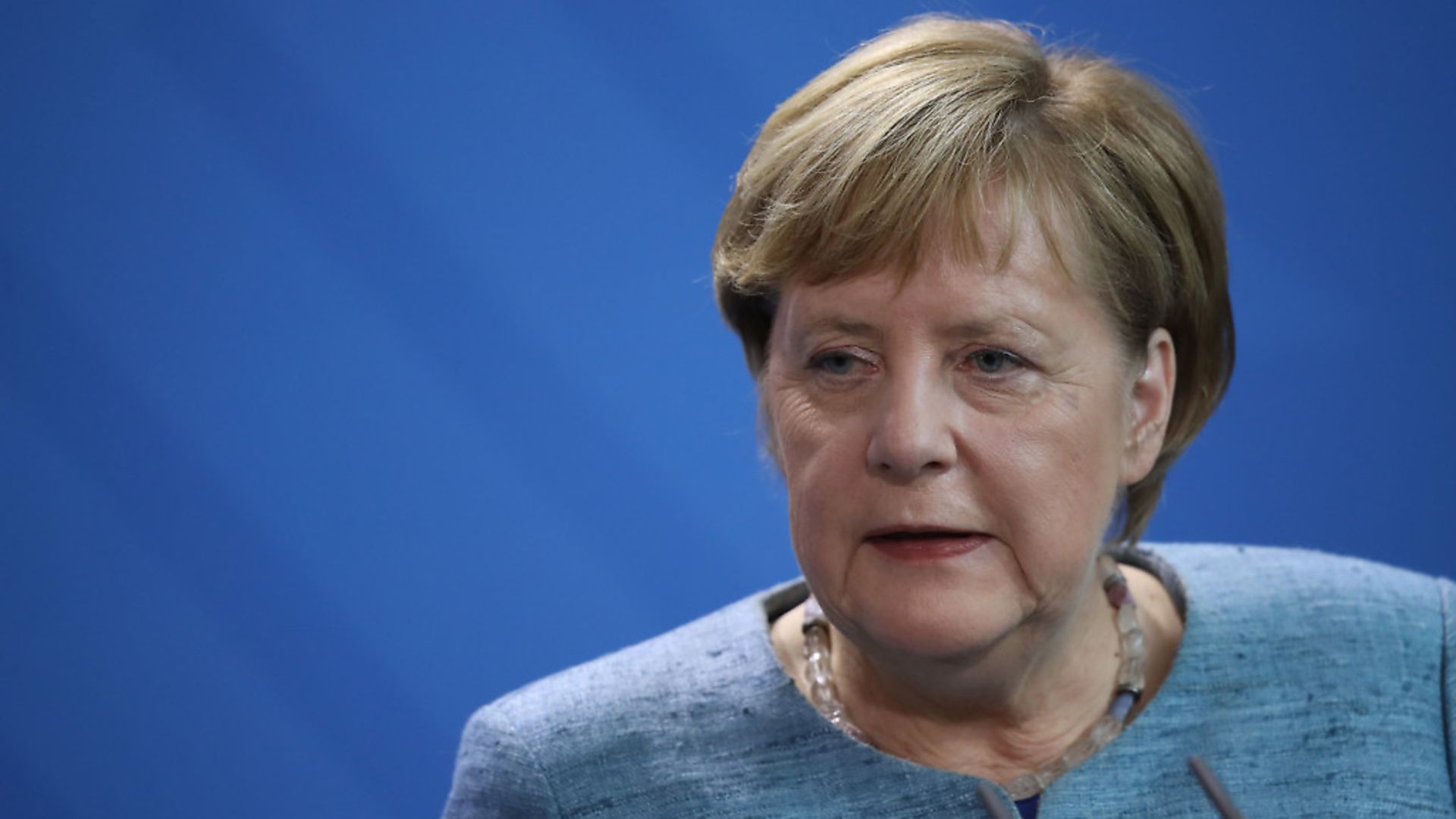
As a leader, the German chancellor provided the moral compass for a continent, says ZOE WILLIAMS. We will all miss her
Angela Merkel is conducting her departure from the world stage with characteristic foresight; indeed, she has announced her intention to step down as head of the Christian Democratic Union so far ahead of time that, if this were British politics, we would just shrug and say, ‘who knows if any of them will be seeking reelection by 2021?’
It is a sobering moment, forcing the realisation of how much we were all relying on her: as the voice of reason and steady humanitarianism; the politician who would name far-right authoritarianism when she saw it, standing a moral head and shoulders above those who’d turn a blind eye for the sake of a trade deal; the leader to whom honesty wasn’t a luxury, and events weren’t a near-constant surprise.
How different would British destinies look, in the hands of such a custodian? How will our relationship with Europe change in her absence (file this question, of course, under ‘ha! If we could predict anything a tenth as complex as that, our predicament would be altogether less of a s**tshow’)? Is there anything Theresa May could learn from Merkel’s unperturbed aspect, any universal gloss of leadership that would see our own prime minister through the unique assault course on which she is presently embarked? Or is Merkel the product of a very specific political environment, uniquely adapted, unreplicable?
Merkel herself is ‘incredibly free, politically,’ says Imke Henkel, a lecturer in journalism at Lincoln University who spent 16 years as foreign correspondent for German news outlets. ‘So I think she would be good at adapting to different environments. But she has extremely German qualities.’
There are well-documented idiosyncrasies to those politics: it is always said that charisma is not prized, but it’s deeper than that. It is actively distrusted, as is rhetorical flourish, passionate oratory. ‘There is a widespread German opinion,’ Henkel says, ‘that if you’re a good speaker, you have something to hide, you’re a bit fishy.’ Along with her awkwardness, her anti-aura, Merkel was known for having no high passions, no ideology beyond a generalised and ultimately platitudinous quest for prosperity, peace and freedom (if we define a platitude as something with which no reasonable person would disagree).
If ‘freedom’ seems like a bolt-on, a rogue bit of abstraction amidst the pragmatism, Merkel’s upbringing in East Germany gave it authenticity, if not verbal fireworks. She always said she was never resistant to the communist regime of her early life, that her approach was to escape if she had to and keep her head down if she didn’t: but her commitment to self-determination for nations was a live affair, not an historical aphorism, and her emergence as the moral compass of the European Union was due in some part to her trenchant opposition to Russia’s invasion of Ukraine, at a time when other leaders seemed ready to accept Putin’s murky, ‘move along, governor, nothing to see’.
The dynamic that persisted between Ossi and Wessi post-reunification is distinctive and well-known: Germany’s sexual politics are less often remarked, while they’ve stamped Merkel’s political journey and affected the world’s perception of her. But we may not have perfectly understood what we were perceiving.
‘Germans are always seen as very emancipated,’ Henkel observes, ‘and women have many rights, maternity leave and all the rest of it. But we are incredibly conservative.’ Indeed, even those rights came after they would have been much use to Merkel, since the drive for female workforce participation, and attendant – pretty half-hearted – interest in universal childcare unfolded over the 1990s and 2000s (Merkel was born in 1954). Being a working mother was an unconscionably tough gig in the 1980s: so the German chancellor was not distrusted for her childlessness the way her British counterpart has been. However, she did have to work around a regular and pronounced chauvinism; hindsight has it that she played it to her advantage.
‘The instinctive behaviour of many women in Germany is to use men’s underestimation to outmanoeuvre them,’ Henkel says, ‘and that’s what she played tremendously well. That would not work in Britain. You cannot imagine Theresa May or Diane Abbott pretending to be humble in that way.’
The Germans have election TV debates called the Elephant Round, scene of Merkel’s triumph over Gerhard Schroeder in 2005. ‘He was absolutely unbelievable. He just said, ‘she can’t do it. She’s not up to it’. And she looked absolutely crestfallen. Her insecurities play very much in her face. She didn’t look like a winner at all.’
Merkel did not start out as ‘mutti’ – she was the sweet little girl, initially, and her transformation to mother wasn’t necessarily a promotion. ‘The translation isn’t as simple as ‘mother’; mutti is a little bit belittling, it’s the small little woman who stands in the kitchen and wonders what everyone else is talking about,’ Henkel explained. If virgin/ whore is the class misogynist dichotomy, this parochial version – sweet little idiot girl/ sweet little idiot old lady – would require extraordinary reserves of patience and loftiness to rise above. You’d have to have your mind on higher things: you probably would need a PhD in quantum chemistry.
So much of Merkel’s political identity – a lack of grandstanding, of vanity, of flights of fancy, a practical air, a tendency to drone, identical trouser suits in shades of sofa – may be quite natural to her, but was also forged of a specific set of necessities that weren’t always obvious from a distance. And so her international standing grew as someone who was truly immune to pomp and artifice and pressure, who simply wanted to get the job done.
That unflappable, cool head slotted so neatly into the German self-fashioning in Europe, especially after the financial crash – the clear-sighted, hard-working patriarch in a family of histrionics – that through a process of national to international refraction, she went from patronised sweetheart to adored figurehead.
Nobody stays inoculated from adulation forever: the eurozone crisis – always, in the German media, called the Greek crisis – arrived when Merkel’s popularity was assured. This was the end of her affair with the only-half-listening international left, which previously could overlook the conservatism and persistent low-wage problem for the doughty overthrowing of the patriarchy.
Germany’s response to Greece was moralistic but not moral: it looked for individual failings in the Greeks themselves – they didn’t work hard enough, they didn’t pay tax – to cover structural failures in the eurozone itself. Her refugee policy had a far more detrimental affect on her popularity at home, and had quite the opposite motivation: Merkel recognised on that occasion that hardship didn’t disappear just because you stranded it at a border, that nothing but sanctuary could meet displacement.
Yet her approach was perceived as arrogant, failing to take either parliament or people with her, failing in the careful trans-national negotiations for which she was famed. If her appeal had always been self-effacement, she had run out of road: arguably, both these crises were symptoms of the new, post-crash world, in which, prosperity no longer assured, questions about inequality were inevitably thrown up to which a well-meaning person who simply wanted comfort for all would no longer have the answer.
Across Europe, we’ll miss her the way we’d miss insulation: never particularly exciting, certainly not inspiring, everything feels chillier and a bit more rickety, a bit less sound, without her. But we couldn’t emulate her.
Warning: Illegal string offset 'link_id' in /mnt/storage/stage/www/wp-includes/bookmark.php on line 357
Notice: Trying to get property 'link_id' of non-object in /mnt/storage/stage/www/wp-includes/bookmark.php on line 37







